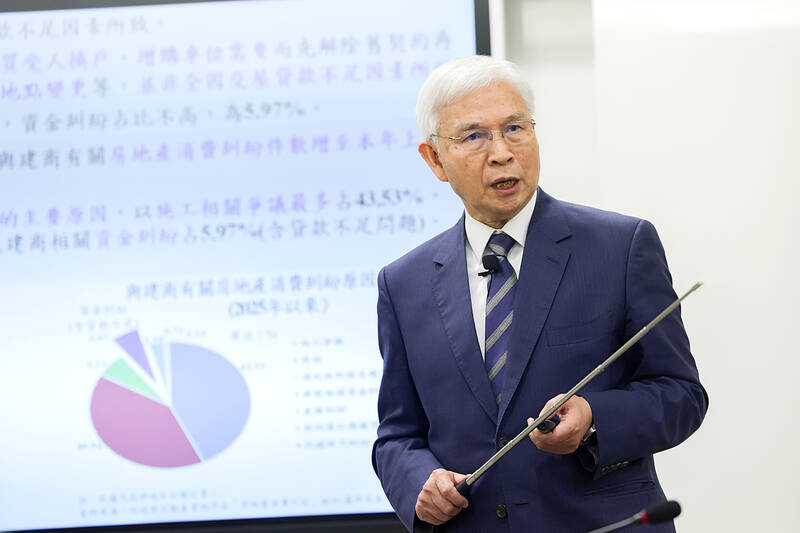UNEVEN:
While the AI boom has benefited tech companies, traditional industries are weighed down by US tariffs and oversupply in China, the bank governor said
By Crystal Hsu /
Staff reporter
The central bank yesterday kept its policy rate at 2 percent and maintained housing loan restrictions, granting only limited flexibility for first-home mortgage applications amid persistent loan concentration concerns.
The bank’s move came after the nation’s GDP growth in the first half of the year reached 6.75 percent, propelled by strong demand for hardware used in artificial intelligence (AI), bank Governor Yang Chin-long (楊金龍) told a news conference in Taipei following the bank’s quarterly board meeting.
Suppliers of hardware for AI products have benefited from the global AI boom, bolstering exports and supporting overall economic activity, Yang said.

Photo: CNA
However, non-technology sectors have seen near-zero growth, weighed down by US tariffs and lingering oversupply in China, underscoring the economy’s divergence and the need for cautious policymaking, he said.
Yang projected growth in the second half of the year to slow to 2.51 percent, leaving full-year GDP at 4.55 percent.
Inflation pressures remain broadly contained, with consumer prices returning to the 2 percent target in the past few months, giving the central bank room to hold rates unchanged even after the US Federal Reserve’s 25-basis-point rate cut over softening employment data.
Still, mortgage lending concentration continues to pose a risk to financial stability, justifying the central bank’s decision to maintain property loan limits, Yang said.
As public frustration grows over insufficient mortgage availability and extended application times following the tightening of lending rules in September last year, the central bank would offer limited support through open market operations, mainly by reducing the issuance of negotiable certificates of deposit, freeing up funds for banks to lend, he said.
A proposed reduction in lenders’ required reserve ratios is seen as less effective, he added.
Many homebuyers have reported insufficient mortgages, averaging 70 percent of purchase prices, down from 80 to 85 percent at earlier contract signing, prompting the Cabinet earlier this month to push for “proper easing” measures.
The Financial Supervisory Commission exempted first-home mortgages from the 30 percent cap on housing loans.
Yang said that measure is sufficient, and the central bank would allow state-run lenders — the primary providers of favorable loans to first-home buyers — some leeway if they miss targets for curbing overall real-estate lending.
Private-sector banks, with greater liquidity, could also step in to help, he added.
Yang described the bank’s monetary stance as “tightening-leaning,” and said that policy adjustments would only be considered if Taiwan’s technology firms — the backbone of exports and GDP growth — show signs of a slowdown.
Looking ahead, demand for emerging technology applications is expected to remain strong, although US tariffs might weigh on global trade, moderating Taiwan’s exports and private investment, he said.
Private consumption could rebound, supporting GDP growth of 2.68 percent next year, Yang said.